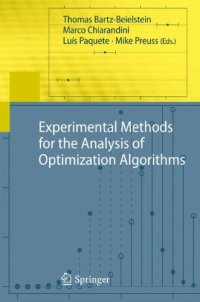
Ebook: Experimental methods for the analysis of optimization algorithms
- Tags: Probability and Statistics in Computer Science, Operations Research Mathematical Programming, Algorithms, Statistics for Engineering Physics Computer Science Chemistry and Earth Sciences, Complexity
- Year: 2010
- Publisher: Springer-Verlag Berlin Heidelberg
- Edition: 1
- Language: English
- pdf
In operations research and computer science it is common practice to evaluate the performance of optimization algorithms on the basis of computational results, and the experimental approach should follow accepted principles that guarantee the reliability and reproducibility of results. However, computational experiments differ from those in other sciences, and the last decade has seen considerable methodological research devoted to understanding the particular features of such experiments and assessing the related statistical methods.
This book consists of methodological contributions on different scenarios of experimental analysis. The first part overviews the main issues in the experimental analysis of algorithms, and discusses the experimental cycle of algorithm development; the second part treats the characterization by means of statistical distributions of algorithm performance in terms of solution quality, runtime and other measures; and the third part collects advanced methods from experimental design for configuring and tuning algorithms on a specific class of instances with the goal of using the least amount of experimentation. The contributor list includes leading scientists in algorithm design, statistical design, optimization and heuristics, and most chapters provide theoretical background and are enriched with case studies.
This book is written for researchers and practitioners in operations research and computer science who wish to improve the experimental assessment of optimization algorithms and, consequently, their design.
In operations research and computer science it is common practice to evaluate the performance of optimization algorithms on the basis of computational results, and the experimental approach should follow accepted principles that guarantee the reliability and reproducibility of results. However, computational experiments differ from those in other sciences, and the last decade has seen considerable methodological research devoted to understanding the particular features of such experiments and assessing the related statistical methods. This book consists of methodological contributions on different scenarios of experimental analysis. The first part overviews the main issues in the experimental analysis of algorithms, and discusses the experimental cycle of algorithm development; the second part treats the characterization by means of statistical distributions of algorithm performance in terms of solution quality, runtime and other measures; and the third part collects advanced methods from experimental design for configuring and tuning algorithms on a specific class of instances with the goal of using the least amount of experimentation. The contributor list includes leading scientists in algorithm design, statistical design, optimization and heuristics, and most chapters provide theoretical background and are enriched with case studies. This book is written for researchers and practitioners in operations research and computer science who wish to improve the experimental assessment of optimization algorithms and, consequently, their design.